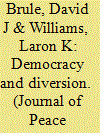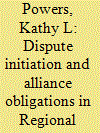| Srl | Item |
| 1 |
ID:
093087


|
|
|
|
|
| Publication |
2009.
|
| Summary/Abstract |
Do legislative constraints constrain or compel democratic executives' conflict behavior during periods of economic decline? Although institutional constraints are thought to reduce democratic executives' propensity to engage in interstate conflict, other research suggests that such constraints may provide incentives to engage in diversionary uses of force. Incorporating work from the comparative study of economic voting and cross-national research on the diversionary use of force, this article contends that government arrangements - coalition, minority, weak party cohesion - influence democratic conflict behavior by (1) shaping the extent to which the executive is held accountable for the economy and (2) determining the executive's capacity to address the economy with legislation. Specifically, the argument presented here suggests that governing parties in coalition governments share the blame for a poor economy, reducing the likelihood that the executive initiates disputes in response to the economy. Compared to single-party majority governments with high party discipline, executives presiding over minority governments, or whose parties are plagued by a lack of cohesion, are more likely to initiate disputes when faced with poor economic conditions, because these executives are likely to face resistance to remedial economic policy. Probit analyses of the interactive effects of government arrangements and economic performance on dispute initiation among industrialized democracies, 1950-97, support the argument. The article concludes with implications for research in comparative politics and international relations, including, for example, executive-legislative relations and strategic conflict avoidance.
|
|
|
|
|
|
|
|
|
|
|
|
|
|
|
|
| 2 |
ID:
072704


|
|
|
|
|
| Publication |
2006.
|
| Summary/Abstract |
States increasingly incorporate alliance obligations into the design of multilateral trade agreements to deter aggression. Regional economic institutions (REIs) are such an example. This policy activity raises the question of whether REI military alliance obligations send signals and function as institutional constraints that deter aggression. Hypotheses regarding the influence of (1) shared REI military alliance obligations on dispute initiation and (2) REI military alliance obligations on whether a potential challenger will initiate a militarized dispute against a potential target are tested. African REIs, states, and their dispute initiations from 1950 to 2000 compose the sample. Logit analysis of time-series, cross-section data is the method employed. African REI military alliances are an example of African international relations' exceptionalism and innovation in institutional design. Findings suggest African REI military alliance obligations reduce the propensity for aggression between member-states and reduce the likelihood that a potential challenger will attack a potential target and a potential target will be the object of attack. The evidence in this article indicates that such commitments reduce dispute initiation among African states.
|
|
|
|
|
|
|
|
|
|
|
|
|
|
|
|